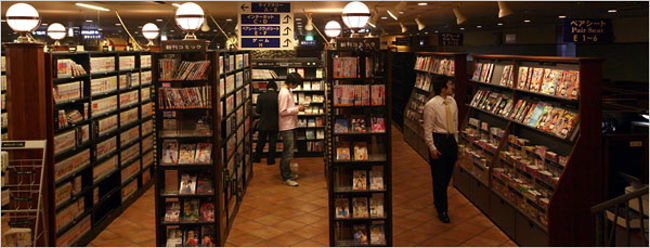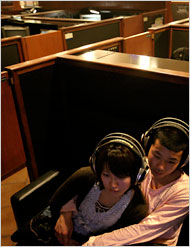May 16, 2006
Cyber-Binge in Japan: Media Immersion Pods

Cyberpunked life continues down the path of the bizarre. The New York Times recently had a very well done article on Japan’s Media Immersion Pods. In Japan, people escape the pressures of society by checking into a Cyber Café for hours on end - sometimes even overnight. Tokyo is now littered with Cyber Cafés that have vast stacks housing all varieties of media (see above) including movies, mangas, music, games, porn, and anything else that captivates the infomania craze. People take these materials back to media immersion pods, which are essentially cube farms, completely decked out with computers, headphones lounge chairs and reading space.
In the world’s most media-saturated city, people take a break by checking themselves into media immersion pods: warrens cluttered with computers, TV’s, video games and every other entertainment of the electronic age.
The Bagus Gran Cyber Cafés are Tokyo’s grand temples of infomania. Situated well above retail level, on the odd floor number where in Manhattan you might find tarot readers or nail salons, these establishments contain row after row of anonymous cubicles. At first glance the spread looks officelike, but be warned: these places are drug dens for Internet addicts.

Apparently, the Cyber Cafés offer an oasis away from modern Japanese society where someone can shed their social encasement in favor of anonymity. In the “real” world, Japanese society is very structured to the point that an individual’s interactions and modus operandi are significantly influenced by their job, family, social status, etc. Cyber Café users are able to pursue their fantasies without reality intruding on them. There are even pods for couples, where couples watch porn and make out, without regard for others just a cube over.
Hidenori Kimura, a sociologist who writes about intercultural encounters, said he believes the Gran Cyber Cafés fulfill a deep and persistent cultural longing. The Japanese system of competition for education, career and social esteem, Dr. Kimura explained, forces young people to obsess over self-presentation, which costs them both fantasy and anonymity, the privileges of childhood. What Japanese young people want, in his view, are opportunities to be free of their social status.
“Traditionally,” he explained, “tea ceremonies and festivals have been fulfilling this role of depriving people of their social status and thus help them become ‘nobody.’ Tea ceremonies deprived the feudal elites of their status and made them just a person enjoying tea ceremony and tea, while festivals among farmers offered an enclave of anarchy during the festivals where they were free of norms and rules of feudal eras.”
The Gran Cyber Cafés now serve this purpose, he said. “Nobody cares what you do, which enables you to be absorbed in whatever fantasy you want to indulge in through Net surfing, Web games or manga. Yet you can satisfy your timid desire to belong.” Staying in the Gran Cyber Cafés, he concluded, is now part of jibun-sagashi, or the search for the true self.
Said another way, the pressures placed on us by the complexification of modern society along with the changes brought about the infomania craze has created significant numbers of infomania addicts. Similar to the opium dens in years past, the Cyber Cafés offer people in society an escape - only this time, instead of checking out, they are checking in. The Cyber Café users of Japan completely immerse themselves in infomedia world as a way of checking out from society. One wonders if this response is unique to Japanese culture, or whether we’ll see the same type of place cropping up in the rest of the industrialized world.




